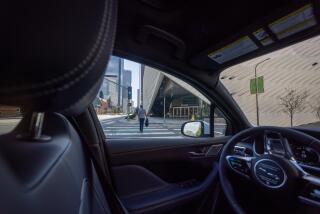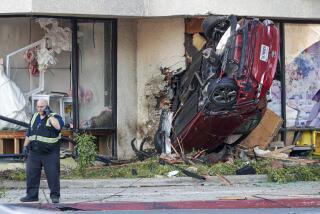Death Toll Rise Seen in Push for Gas-Saving Cars
- Share via
WASHINGTON — A push to put Americans into smaller cars as a way of reducing dependence on foreign oil could raise the death toll on the nation’s highways, a safety research group said today.
The Insurance Institute for Highway Safety said death rates in U.S.-made cars are coming closer to those for Japanese autos as new models are built closer to the same size. Japanese cars, on average, are getting larger while American cars are getting smaller.
And, an institute study concluded, fatalities in 10 of 11 General Motors models increased after smaller models of the cars were produced.
The institute, which is financed by auto insurance companies, researches a wide range of highway safety issues.
Institute President Brian O’Neill said there are ways to save more fuel without making cars smaller, including engine changes that put less emphasis on power and speed and measures that relieve urban congestion.
Cars get their best mileage traveling at 40 m.p.h, the institute said. A car that achieves more than 30 miles per gallon on the highway can slip to below 20 m.p.g. at higher speeds and to less than 10 m.p.g. crawling through a traffic jam.
“I’m as good an environmentalist as the next guy, but I believe we have to look at the complete picture,” O’Neill said.
He said the safety benefits of larger cars and the need to make vehicles safer often are ignored in the debate over fuel conservation.
Concern over U.S. dependence on foreign oil, coupled with continuing concern for the environment, is expected to give new life to legislation that would toughen fuel economy standards for the auto industry. One proposal would require auto makers to increase fuel economy 20% in passenger cars by 1995 and 40% by 2001.
Car makers say that to achieve such standards, cars will have to be smaller.
Smaller cars are more prone to rolling over and damage that can injure occupants, the institute said.
SAVING GAS VS. SAFETY
Based on an analysis of death rates and fuel ratings for 47 four-door cars, on average, for every one mile-per-gallon improvement in fuel economy, there is a 3.9% increase in the death rate.
Overall, the death rate in the smallest cars on the road is more than double the rate in the largest cars: 3 deaths per 10,000 registered cars for the smallest cars and 1.3 for the largest in both single- and multiple-vehicle crashes in 1989.
The frequency of damage claims for small, two-door cars is 35% higher than for large two-door cars.
Among the 29 two- and four-door cars with the highest frequency of injury claims, 27 are small and two are mid-sized. Among the nine cars with the lowest injury claim frequencies, seven are large and two are mid-sized.
SOURCE: The Insurance Institute for Highway Safety






